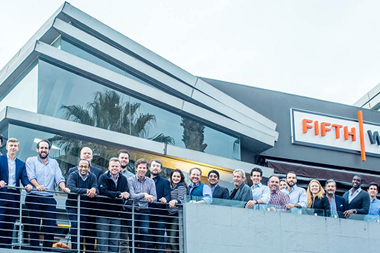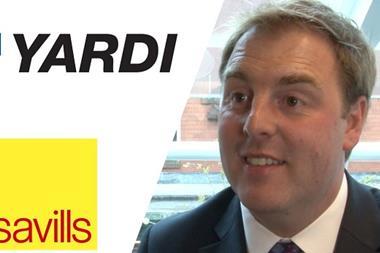Firms need to mitigate risk through due diligence, aiming for a single supplier system and investing in resources.

The life of an investment manager has changed immeasurably over the past decade, due largely to the impact of technological advances. Take a look back at the late 1990s and early 2000s and your average investment manager was running around town collating data from their real estate portfolio on a very granular level.
They had huge swathes of details to report on including tenant leases, rent, building maintenance, etc. This formed the basis of all their asset management and investment decisions. You can see where problems arose.
Fast forward in time and they may still be running around town with the same vigour but technology has enabled much smarter time management.
Technology is used in real estate for a number of reasons: to drive efficiencies; accommodate growth; increase transparency; maintain auditability; and deliver increased levels of central control.
This can be through automation of menial tasks, the speeding up of accounting processes, regular reporting to investors or simply through the ease of having vital data at the touch of a button.
Despite investment managers embracing technology overall, the sector is largely still playing catch-up when it comes to management systems. Obstacles are often unwittingly introduced when implementing new technology systems and ironically can result in the exact opposite outcome to what was intended: efficiency savings.
So why, in many cases, has the industry taken its eye off the ball when it comes to making tech work for them? Investment managers, whether commercial, residential, retail or industrial, have to ask themselves what it is that they want from technology. What role does it need to play within their business? What responsibility do they have to their investors and how can they utilise technology to better manage property investments to maximise returns for their investors?
The only way to make sure technology is helping with its main objective of efficiency is through a single stack system from as few suppliers as possible
In many cases, property companies, pension funds and public sector landlords will simply want better levels of property management and financial accounting.
The capability of technology is vast and flexible, allowing the highest level of accounting right down to the transactional level of a single rent payment or an individual supplier invoice.
Firms are all too often implementing new systems and bolt-ons to plug gaps or even prop up current technology systems.
It can become a real nightmare when, for example, there are five different suppliers of five different products within the technology solution.
It is very easy to fall into this trap where suddenly there are several different systems and providers being used. If something goes wrong with the technology each supplier will point the finger at the other and go round in circles before the root of the problem is discovered.
Practicality and operational risks
As well as accountability, using several suppliers also throws up practicality and operational risks. The only way to really guard against those risks and make sure technology is helping, and not hindering, with its main objective of efficiency is through a single stack system from as few suppliers as possible.
To get as close to a single system as possible, a degree of due diligence needs to be carried out. Does the supplier have a sufficient level of resources? Are there high levels of reinvestment in the business to keep the product at the forefront of technology and forefront of functionality? Is the system fully web-enabled? What database does the product reside on - SQL or Oracle? If it is cloud-based then where are the data centres located? Technology is all about research and development, so reinvestment in the product to keep it at the forefront of technology and forefront of functionality is vital.

Technology companies need to have their finger on the pulse and understand exactly what the market requires of them from a technological, functional and compliance standpoint. That way they can develop the system functionality and provide the resource that is most relevant to this niche market.
The accounts of the technology companies can make for very interesting reading. It’s always fascinating to see where they spend their money. Does it go into research and development or do the profits just get taken out every year?
If due diligence is carried out before procuring the technology, it can go a long way in solving issues of accountability if expectations aren’t met down the line. That accountability lies both with the investor and the technology company.
Financial outlay
Some of the accountability must lie with the investors because they have to commit to it fully both financially and practically. They have to make the resources available to implement the system properly and that can mean a financial outlay. There’s a lot of out-of-date technology in the market and I don’t think a lot of people realise that. If they don’t fully commit to it, there will undoubtedly be problems that will continue to arise.
Ultimately investment managers want the technology to help make informed strategic business decisions. It should help them gain more visibility of the investment journey to identify and mitigate risk and evolve the investment strategy.
That means having sight of everything they own and information and data on everything that goes on around their portfolio - a single source of the truth, if you like. And you only get that with a single system.
It provides much more clarity if you have one source of data. If you have multiple systems and solutions you lose sight of what’s going on in your portfolio, which means you’re less informed, meaning your investors are less informed and perhaps more nervous as a result.
It provides more quality and clarity when reporting back to investors, so using intuitive, personalised dashboards and portfolio information can make them see how their money is being put to work. There is nothing being hidden and investor and shareholder trust and credibility is gained.
In order that investment managers get the optimum benefits from their technology, they unequivocally have to buy into it, carry out comprehensive due diligence, aim for a single supplier system and invest in resources to implement it properly.
Mike Cook is regional solutions manager at Yardi

About Yardi
Now in its fourth decade, Yardi is committed to the design, development and support of software for real estate investment management and property management. With the Yardi Commercial Suite, Yardi Residential Suite, Yardi Investment Suite and Yardi Orion Business Intelligence, the Yardi Voyager platform is a complete real estate management solution. It includes operations, accounting and services with portfolio-wide business intelligence and platform-wide mobility. Yardi serves clients worldwide from offices in Australia, Asia, the Middle East, Europe and North America.






























No comments yet